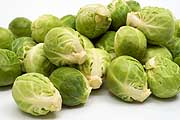Brussels Sprouts Nutrition Facts

Brussels sprouts are best described as a group of small, leafy, mini cabbages with a green or yellowish tone. They grow on thick, long stalks and are generally picked off by hand in the winter season. They are therefore classified as a winter vegetable. Brussels sprouts may either be boiled to accompany soup or roasts, or alternatively they can be chopped up and added to stir-fries.
Brussels sprouts are not particularly popular vegetables, and were voted Britain's most hated vegetable in 2002. This could possibly be due to their strong smell or bitter taste. The unpleasant smell of Brussels sprouts is caused by sulfur compounds, which are released when cooked. However, the way in which Brussels sprouts are cooked could affect the release of this unpleasant smell.
Brussels sprouts are an excellent source of vitamins K and C: 156 grams of Brussels sprouts contain 273% of the RDA for vitamin K, and 161% for vitamin C. They are also a very good source of folate, vitamin A, manganese, dietary fiber, potassium and vitamin B6, and a good source of tryptophan (an essential amino acid), thiamin, omega-3 fatty acids, iron, phosphorus, protein, magnesium, riboflavin, vitamin E, copper and calcium.
There is a growing body of evidence pointing to Brussels sprouts as a powerful cancer prevention food. Plant phytonutrients found in Brussels sprouts enhance the activity of the body's natural defence systems to protect against disease, including cancer.
In the Netherlands Cohort Study on Diet and Cancer, in which data was collected on over 100,000 people for more than six years, those eating the most vegetables benefited with a 25% lower risk of colorectal cancers, but those eating the most cruciferous vegetables, such as Brussels sprouts, did almost twice as well with a 49% drop in their colorectal cancer risk.
Researchers, also in the Netherlands, investigated the effect of a diet high in Brussels sprouts on DNA damage. They compared two groups of healthy male volunteers. Five men ate a diet that included 300 grams (about 10 ounces) of cooked Brussels sprouts daily, while the other five men at a diet free of cruciferous vegetables. After three weeks, the group that ate Brussels sprouts had 28% decrease in measured DNA damage. Reduced DNA damage may translate to a reduced risk of cancer since mutations in DNA allow cancer cells to develop.
Especially if you are pregnant, consider learning to love Brussels sprouts. A cup of Brussels sprouts supplies 93.6 mg of folic acid (also called folate), a B-vitamin essential for proper cellular division because it is necessary in DNA synthesis. Without folic acid, the fetus' nervous system cells do not divide properly. Deficiency of folic acid during pregnancy has been linked to several birth defects, including neural tube defects like spina bifida. Despite folic acid's wide occurrence in food (it's name comes from the Latin word folium, meaning "foliage", because it's found in green leafy vegetables), folic acid deficiency is the most common vitamin deficiency in the world.
Author: Dimi Ingle.
Copyright 2009: Remedium. This article may not be copied, in whole or in part, without the written consent of Remedium.
|